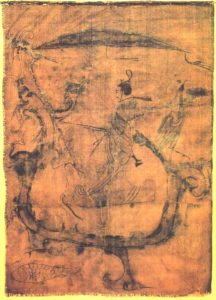with the Boss, Your Spouse, Your Lover, Anyone in a Position to Help You or Harm You

夫龍之為虫也,柔可狎而騎也;然其喉下有逆鱗徑尺。若人婴者,則必殺人。人主亦有逆鱗。説者能無婴人主之逆齡,則幾矣。
The dragon is a gentle beast. If you indulge him and humor him, you may ride on his back. But beneath his throat there are transverse scales a foot long, and if you touch those scales, he will kill you. The lord of men also has transverse scales. Someone who is able to avoid touching the ruler’s transverse scales is well on the way to mastering the art of persuasion.
This is a passage from the Han Feizi, considered to be one of the early masterpieces of Chinese prose. The book named for its assumed author, Han Fei (c.279-233 BC), the major thinker in the “Legalist” tradition. The Legalists believed that the way to public order was through a strict set of laws rigorously and impartially enforced. They assumed human beings were inherently self-seeking: each one of us is out for one’s self. The way to stable order is to assure that good behavior, as set forth in the laws, is rewarded, and that violations of the laws punished. Good behavior will then accord with self-interest. There is much in Han Fei’s thinking that is consistent with contemporary rational choice theory.
This passage, in contemporary terms, addresses the “principal-agency” problem, and may show an inherent paradox, maybe even a contradiction, in Legalist thinking and perhaps in rational choice thinking generally. The “principal” (in this case, the ruler; or the boss; or, more generally, the person in a position to reward or punish) has as his goal, presumably, the good of the organization (here, the state). The role of the ruler, in Han Fei’s opinion, is to stipulate the laws and then to enforce those laws that he has stipulated; he should abstain from any personal interventions that snarl up the smooth functioning of the law. The ruler cannot personally enforce the laws, but has to rely upon servants or ministers who act for him, his agents. The ruler’s main job, then, becomes to hold the agents accountable for the smooth operation of the laws, rewarding them for doing a proper job and punishing them when they don’t. The ruler can properly hold the officials accountable only by remaining aloof and impartial, measuring all his actions and theirs by the objective standard of the law. Similarly, in order to get honest advice, the ruler must refrain from expressing personal policy preferences. If the agents know the ruler’s personal preferences, they will cater to them for the sake of their own benefit and to the detriment of public order.
The problem, though, is that rulers are human as well, with their likes, dislikes, tastes, and prejudices, a constant source of frustration for Han Fei. The passage above is the conclusion of an essay advising how proper officials, men skilled in technique and attached to the law, should be able to win the ruler’s favor and attention. The methods or techniques he advocates are the sort familiar from treatments of the art of courtsmanship: identify the ruler’s character and play to it; if he is of a cynical turn, explain how policies will profit him; if he fancies himself high-minded, avoid talk of profit and talk of honor, justice, or glory; if he likes to act high-minded but in fact tends toward venality, talk of honor and justice, but hint at how that policy is also profitable. So forth. Avoid those “transverse scales,” the sore points on which he is especially touchy, or too clearly revealing of the baser parts of his character.
The paradox is that the Legalist system functions properly only if the ruler is committed to the public good (for Han Fei, basically the strength and stability of the state) and cannot be swayed by appeals to those personal desires contrary to or irrelevant to the public good. But since rulers, like everyone else, respond to personal desires, good officials must persuade them—really, manipulate them—into doing the right thing. But 1) the system breaks down if the ruler is subject to manipulation, whatever the motive of the manipulator; and 2) just where do these “good” officials come from since, by the general hypothesis, we are all prone to indulge our personal preferences and pursue personal profit. The whole thrust of Han Fei’s view of government is that good order does not depend upon the character of either the sovereign or his agents, but on the availability of a smoothly-operating system.

One thought on “Han Feizi on How to Get Your Way”
Comments are closed.